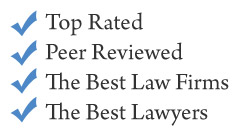Preventing Accidents Before They Happen - Getting You Help When They Do
- Home
- About Us
- Find an Accident Attorney
- Safety News
- Safety Guides
- Car Safety eBook
- Car Seat Safety Checklist
- Crowd Safety Guide
- Dog Bite Prevention Guide
- Elder Driver ~ License Checklist
- Family Media and Technology Agreement
- Fireworks Safety Checklist
- Five S’s of Playground Safety Flyer
- Head Injuries Guide
- Hospital Safety eBook
- How to Stay Safe After an Auto Accident
- Teen and Parent Driving Agreement
- Travel Safety Checklist
- Accident Claims Explained
- Defective Product Lawsuits
- Construction Site Accident Claims
- Legal Malpractice Claims
- Medical Malpractice Lawsuits
- Anesthesia Error Claims
- Birth Injury
- Cerebral Palsy Lawsuits
- Claims Against the Federal Goverment
- Emergency Room Error Lawsuits
- Erb’s Palsy Lawsuits
- Misdiagnosis and Delayed Diagnosis
- Failure to Diagnose Brain Tumors
- Failure to Diagnose Breast Cancer
- Failure to Diagnose Cervical Cancer
- Failure to Diagnose Colon Cancer
- Failure to Diagnose Lung Cancer
- Failure to Diagnose Prostate Cancer
- Failure to Diagnose Bacterial Meningitis
- Failure to Diagnose a Heart Attack
- Failure to Diagnose Melanoma
- Failure to Diagnose Stroke
- Wrongful Birth Lawsuits
- Wrong Site Surgery Lawsuits
- Mesothelioma
- Motor Vehicle Accident Attorneys
- Nursing Home Negligence Lawsuits
- Offshore Accidents
- Personal Injury Claims
- Premises Liability
- Statutes of Limitations
- Workers’ Compensation Claims
- Wrongful Death Lawsuits
Search by State
Accident Attorneys In New York
Narrow Your Search By Selecting A Market
Use the listing(s) above to find the right New York accident attorney for you
or contact us today and we'll connect you with someone that can help.
New York Motor Vehicle Accident Laws and Safety Requirements
The roads of New York State are some of the safest in the nation – only Massachusetts and the District of Columbia can boast fewer fatalities per capita. Given New York’s high population, however, that still leaves well over a thousand deaths a year, with several thousand more suffering serious injuries. New York personal injury and wrongful death laws are designed to compensate victims, and its safety laws are designed to prevent accidents and injuries from occurring in the first place.
Statute of Limitations: In New York, you have two years beginning with the date of the accident to file a personal injury lawsuit or a property damage lawsuit (you can combine both claims in the same action). If the victim dies, the personal representative of the deceased victim’s estate has two years from the victim’s date of death to file a wrongful death lawsuit.
When the Victim is Partly at Fault: New York is a pure comparative fault state. If the victim was partly to blame for the accident, the court will assign the victim a specific percentage of fault based on the evidence, and then subtract that exact percentage from the victim’s damages award. The same method applies even if the victim was mostly to blame for the accident.
Fault/No Fault Rule: New York is a “no fault” state – you must exhaust your own insurance resources before looking to the other driver’s insurance, no matter whose fault the accident was, and you can’t sue the other driver. The only exception is if your injury was “serious” as New York law defines that term.
Minimum Insurance Coverage: In New York, minimum liability coverage limits are $25,000 per injured victim, $50,000 personal injury per accident, and $10,000 property damage per accident.
Uninsured/Underinsured Motorist Coverage: New York drivers must purchase uninsured/underinsured motorist insurance with minimum coverage limits of $25,000 per injured victim and $50,000 personal injury coverage per accident.
Types of Damages Available: Full compensatory damages are available. There are no caps on non-economic or punitive damages unless medical malpractice was involved. Punitive damages require proof of malice.
Product Liability for Defective Vehicles: No-fault product liability is available; however, the plaintiff must prove that the defendant manufactured the product.
Suing the Government over Defective Roadways (Sovereign Immunity): You can sue a state or county government (or a public corporation) for money damages; however, you will be subject to stringent procedural requirements, time limitations and jurisdictional restrictions.
Motorcycle Helmet Laws: All motorcycle riders must wear helmets on New York roads.
Seat Belt Laws: Occupants under 16 must wear seat belts in New York. Occupants 16 and older must wear seat belts while sitting in the front seat. The maximum fine for a first offense is $50.
Dram Shop Law: Licensed alcohol vendors and social hosts are civilly liable for selling alcohol to minors under 21 who injure a third party while intoxicated. Vendors face the same liability for serving obviously intoxicated adults, but social hosts do not.
DUI/DWI Penalties (first offense): New York has some of the stiffest DUI penalties in the nation. A first offense can result in a jail term of up to a year, a fine of $500 to $1,000, and a minimum driver’s license suspension of six months.
Distracted Driving (texting while driving, etc.): New York drivers may not text or use hand-held electronic devices while driving.
Creative Commons Attribution 4.0 International License · Site Map · Terms of Service · Log in
ATTORNEY ADVERTISING. The information provided on this website is not legal advice. No attorney-client relationship is formed by the use of this site. The attorney listings on the site are paid-for attorney advertisements and do not constitute a referral or endorsement by a state agency or bar association. It is not stated or implied that a lawyer is certified as a specialist in any particular field of law. No results are guaranteed, and prior results do not guarantee a similar outcome. This site is informational, only, not dispositive; it is up to you to decide whether a particular lawyer is right for you. Contingency fee refers only to attorney’s fees; a client may incur or be liable for other costs or expenses. Use of this site is subject to your agreement to these Terms and Conditions. If you are seeking an attorney in Florida, please read the additional state advertising disclosure.













